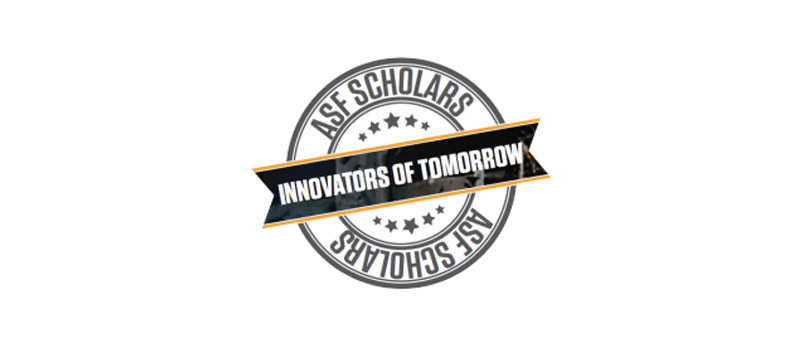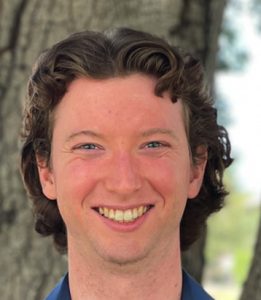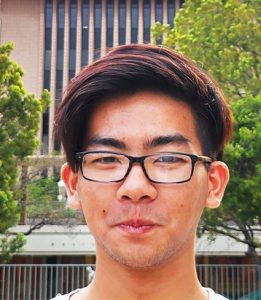Two Harvey Mudd Students Named 2023 Astronaut Scholars
July 11, 2023
Two Harvey Mudd College students have been selected by the Astronaut Scholarship Foundation to join the elite group of Astronaut Scholars for the 2023–2024 academic year. Ryan O’Hara ’24 and Lucien Tsai ’24 were chosen for their exemplary academic performance, ingenuity and unique aptitude for research.
Offered to students pursuing degrees in STEM, the 2023 ASF Astronaut Scholarship was awarded to 68 undergraduate junior- or senior-year students from 46 U.S. universities and colleges. Faculty members at ASF-partnering institutions nominated students for the scholarships (up to $15,000). Other benefits include networking and mentoring opportunities with astronauts, alumni and industry leaders; participation in the Michael Collins Family Professional Development Program; and a paid trip to attend ASF’s Innovators Week, which provides an opportunity for the Astronaut Scholars to present their research at a technical conference.
Ryan O’Hara ’24

O’Hara is a transfer student double majoring in environmental robotics and computer science/math. He is founder of a direct air capture (DAC) solution that pulls CO2—the primary greenhouse gas driving climate change—from the air and sequesters it away beneath the Earth so it can no longer warm our planet. O’Hara has created a DAC robot that floats on the ocean and uses hydropower and biochar to sequester carbon dioxide. He was inspired to develop his startup during Harvey Mudd’s Entrepreneurship class, led by Kash Gokli, engineering professor and director of entrepreneurship initiatives. O’Hara has since created the startup Apsis Robotics and, in July, he received the 776 Fellowship, a $100,000 grant to help him launch his carbon capture technology.
O’Hara has considerable experience in the climate science community. He worked with Melanie Pickett at NASA’s Kennedy Space Center on the development of an algae-based life support system for the International Space Station, Jeff Schell and the Sea Education Association on a two-month ocean expedition studying the effects of climate change on marine ecosystems, and Sawyer Fuller at University of Washington to build microrobots for use in atmospheric monitoring. This summer, he is working under Swati Saxena at NASA Ames Research Center to build an AI system to monitor contrail emissions.
O’Hara has done climate policy work with the UN and Intergovernmental Panel on Climate Change and is involved in local electoral politics. “I was recently involved in getting a very pro-environmental candidate elected to the Los Angeles city council,” he says.
O’Hara plans to pursue a PhD in earth sciences and engineering. After that, he’ll likely pursue a research career (through entrepreneurship or government work) in climate tech and climate change solutions.
Lucien Tsai ’24

Tsai is inspired by the vision of a world where sustainable materials can replace current energy-intensive materials. With a focus on polymer-based materials, he conducts pure and applied research in materials science to understand the physical principles that govern extraordinary functional and mechanical properties and better inform the design of new materials.
At Harvey Mudd College, Tsai works in the Physics of Soft Matter Lab, advised by Professor Mark Ilton, where he performs novel dynamic mechanical analysis measurements to understand the viscoelastic behavior of soft matter and the various theories developed to model their mechanical properties. He has presented this work at conferences, including the American Physical Society March Meeting and is working to publish a paper about it.
“I am excited about the implications of my work in understanding the energy dynamics of rate-asymmetric, ultrafast biological movements and the applications to emerging fields such as soft robotics and bioengineering in which viscoelastic structures are employed in cyclic mechanical stretching,” says Tsai.
During an internship at Lawrence Livermore National Laboratory, Tsai aided researchers in the synthesis of mesoporous silica particles used in direct air capture. This led him to a deeper understanding of the physical and chemical conditions that influence polymer interactions at the molecular level. This summer, he is working with Mayumi Koichi at the University of Tokyo on strong and resilient hydrogels.
Tsai plans to pursue a PhD in materials science. “Guided by fundamental physical principles and patterns found in nature, I hope to discover the underlying principles for strong yet sustainable materials to replace traditional metals and concrete,” Tsai says.
The ASF is a nonprofit organization established in 1984 by the six surviving members of America’s original Mercury astronauts. The Astronaut Scholarship is the nation’s largest, merit-based monetary award given to science and engineering undergraduate students. Harvey Mudd College is one of 41 institutions—and the only non-doctorate granting school—selected by the foundation to participate in the program.
